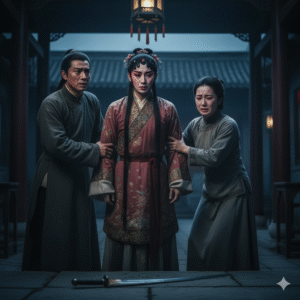Farewell My Concubine: A Timeless Masterpiece of Chinese Cinema
Introduction
When discussing the greatest works of world cinema, Farewell My Concubine (1993), directed by Chen Kaige, stands as a monumental achievement. The film is not only a personal story of love, jealousy, and betrayal but also a sweeping historical narrative that captures the tumultuous changes in 20th-century China. Through the lens of Beijing Opera, the story navigates the complexities of art, politics, gender identity, and human frailty. Winning the Palme d’Or at the Cannes Film Festival, it remains one of the most acclaimed Chinese films ever produced, representing a bridge between Chinese tradition and global cinematic recognition.
This article explores the film’s story, themes, artistic brilliance, and cultural importance. More than just a film about a concubine role in Beijing Opera, Farewell My Concubine is a meditation on survival, loyalty, and the tragic costs of love under the weight of history.
Background and Production
Farewell My Concubine is based on the novel by Liliane Lee (Li Bihua), a Hong Kong writer known for exploring gender and identity through art. Chen Kaige, already a rising star of China’s “Fifth Generation” filmmakers, took on the adaptation with a commitment to authenticity and emotional depth.
The film stars:
Leslie Cheung as Cheng Dieyi, the opera actor famous for playing female roles (dan).
Zhang Fengyi as Duan Xiaolou, his stage partner and sworn brother.
Gong Li as Juxian, a former courtesan who becomes Xiaolou’s wife.
Shot with lavish sets and meticulous attention to Beijing Opera traditions, the production faced challenges from Chinese censors due to its depiction of homosexuality, political upheaval, and sensitive historical events. Despite initial resistance, its global success forced a reevaluation of China’s place in international cinema.
Plot Overview
The film spans five decades of Chinese history, interweaving the personal with the political:
Childhood and Training
Cheng Dieyi and Duan Xiaolou are left in the care of a Beijing Opera training school. Brutal instructors force them into submission, shaping Dieyi into a dan performer. Dieyi, delicate and feminine, is cast as women; Xiaolou, strong and resilient, is trained as male heroes. Their bond, forged in suffering, becomes the foundation of their lifelong partnership.The Rise to Fame
As adults, Dieyi and Xiaolou achieve fame performing Farewell My Concubine, an opera based on the legend of Consort Yu, who sacrifices herself for her king. Dieyi, blurring the lines between role and reality, becomes emotionally dependent on Xiaolou, mistaking their stage relationship for real devotion.The Disruption of Juxian
Xiaolou marries Juxian, a beautiful courtesan, creating a love triangle. Dieyi feels betrayed, as he cannot separate himself from his operatic role as the faithful concubine.War and Revolution
The story unfolds against the Japanese occupation, the Nationalist-Communist struggle, and later the Cultural Revolution. The trio’s relationships are strained by loyalty tests, betrayals, and political coercion. At different times, each is forced to denounce the others for survival.Tragic Resolution
In old age, the characters reunite to perform again. Dieyi, overwhelmed by the permanence of his role and the impossibility of love, performs the opera one last time — and, like the concubine in the story, chooses death as his final act of devotion.

Themes and Symbolism
1. Art as Life, Life as Art
The central metaphor of the opera within the film reflects how performance and reality merge. Dieyi cannot separate his role as the concubine from his real feelings toward Xiaolou. The blurring of identity shows both the power and the tragedy of art.
2. Loyalty and Betrayal
The repeated betrayals — between friends, lovers, and even self-betrayals under political pressure — reflect the instability of a society in flux. The film asks: is loyalty possible when survival is at stake?
3. Gender and Identity
Dieyi embodies the complexity of gender performance. Trained to embody femininity, his true identity becomes inseparable from his stage persona. His unrequited love for Xiaolou challenges heteronormative traditions, making the film one of the earliest global works to portray queer identity with nuance.
4. The Weight of History
The film is as much about China as it is about individuals. From the Warlord Era to the Cultural Revolution, personal fates are repeatedly crushed by political storms. The story shows how history dictates choices, often stripping individuals of agency.
5. The Concubine as a Symbol
The opera Farewell My Concubine tells of Consort Yu’s sacrifice for her king. Dieyi mirrors this devotion, sacrificing his happiness and ultimately his life for Xiaolou. The concubine becomes a symbol of doomed love, eternal loyalty, and inevitable loss.
Character Analysis
Cheng Dieyi (Leslie Cheung)
Dieyi is the emotional core of the film. His fragility, devotion, and blurred sense of self reflect the pain of an artist trapped between roles. Leslie Cheung’s performance, filled with vulnerability and restraint, remains one of the most iconic in world cinema.
Duan Xiaolou (Zhang Fengyi)
Practical and grounded, Xiaolou embodies masculine resilience. Yet his inability to fully understand Dieyi’s devotion makes him both sympathetic and flawed. His survival instincts often drive him to betray those closest to him.
Juxian (Gong Li)
As a former courtesan, Juxian is initially seen as a rival to Dieyi. Yet she is also a victim of circumstance, seeking stability in love and marriage. Gong Li’s portrayal brings depth to a character who might otherwise have been a mere obstacle in the love triangle.
Cinematography and Artistic Style
Cinematographer Zhao Fei and Chen Kaige crafted visuals that balance operatic grandeur with intimate human drama. The lavish opera sequences showcase the rich colors, costumes, and movements of Beijing Opera, while the grittier depictions of war and revolution ground the film in historical reality.
The use of mirrors and reflections underscores themes of identity, performance, and illusion. Long takes and sweeping shots enhance the epic scale, while close-ups capture the raw intensity of personal emotion.

Historical and Cultural Context
Farewell My Concubine traverses China’s 20th-century upheavals:
The decline of the Qing dynasty’s traditions.
The Japanese occupation during WWII.
The rise of the Communist Party.
The Cultural Revolution, which targeted artists as enemies of the people.
The film was groundbreaking for its frank depiction of same-sex love, censorship-defying historical critiques, and unflinching portrayal of the Cultural Revolution’s cruelty. For global audiences, it provided rare insight into China’s political and cultural transformations through deeply personal storytelling.
Reception and Global Impact
The film premiered at Cannes in 1993, where it won the Palme d’Or, tying with Jane Campion’s The Piano. Critics praised it as a masterpiece of storytelling, acting, and visual artistry.
Globally, it became a landmark in queer cinema, though in China, authorities censored parts of it due to its depiction of homosexuality and politically sensitive periods. Nonetheless, it remains one of the most celebrated Chinese films ever made.
Legacy
Three decades after its release, Farewell My Concubine continues to be studied in film schools and celebrated at retrospectives. Its influence extends beyond Chinese cinema, inspiring discussions on:
The intersection of art and politics.
The representation of queer identity in restrictive societies.
The role of opera and traditional performance in modern storytelling.
For many, it is not just a film but a cultural milestone — a reminder of cinema’s power to transcend borders while capturing the universal human struggle for love and meaning.
Conclusion
Farewell My Concubine is more than a concubine movie; it is a meditation on loyalty, betrayal, and the crushing weight of history on personal lives. Through the tragic story of Cheng Dieyi, Duan Xiaolou, and Juxian, the film paints a portrait of devotion and despair that resonates across cultures.
Its artistry, emotional depth, and historical sweep make it a favorite concubine film not only in title but also in spirit. Like Consort Yu, the characters sacrifice everything in the name of love and survival, leaving audiences with a haunting reminder of the costs of fidelity in an unforgiving world.
Even today, Farewell My Concubine endures as a masterpiece — a story of art and identity that will never fade, much like the opera it immortalizes.
